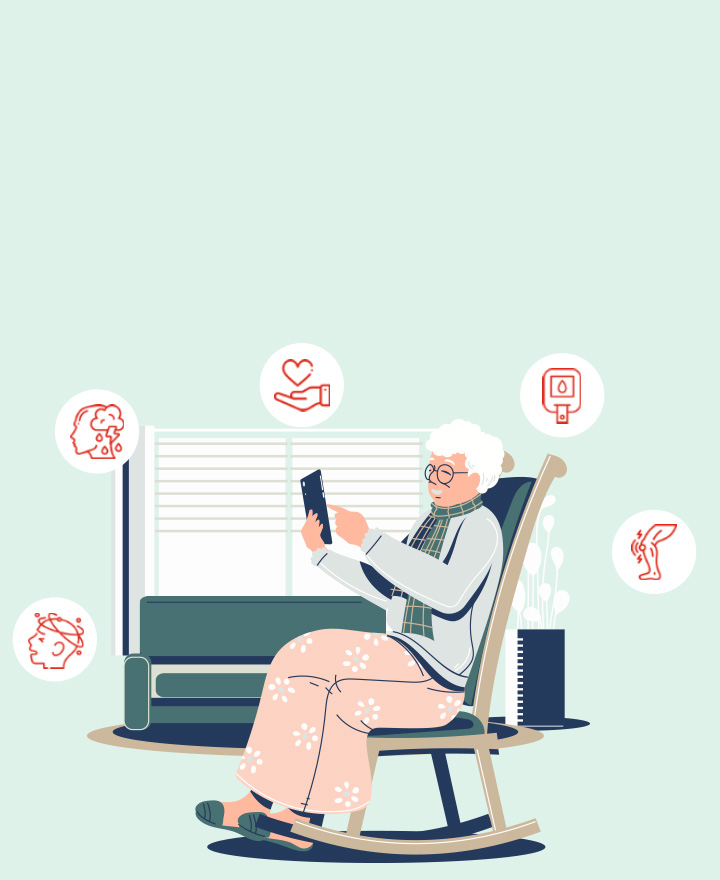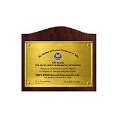

10 Common Ailments in the Elderly
Aging is an inevitable part of life. With time, you mature as a person, fulfil many of your dreams, start your own family, and start to appreciate life. But it also takes away something - your youth. With age, your metabolism tends to slow down, and your immunity also gets weaker. Which makes you more susceptible to various critical illnesses. So, it makes sense to know about the common diseases that might affect you in old age, so that you can spot the symptoms early on and get the right treatment as soon as possible.
Now, let’s delve deeper into the 10 common diseases in elderly people
1. Chronic obstructive pulmonary disease (COPD):
It is a lung disease that obstructs airflow from the lungs. In simpler words, it leads to breathing difficulty. You are likely to show symptoms like excessive coughing, chest tightness, and wheezing. Its two main conditions are emphysema and chronic bronchitis. Someone with COPD is vulnerable to heart disease and lung cancer as well. Smokers are most likely to suffer from its impact, but it can happen to anyone who has had long-term exposure to pollution, irritating gases, or particulate matter.Quitting smoking is one way to prevent COPD, or at least, slow its progression. Staying away from smoke, chemical fumes, and dust can keep your lungs healthy. Vaccination against the flu and pneumonia is also recommended.
2. Alzheimer's disease and dementia:
Alzheimer’s disease is one of the common diseases in elderly people and a progressive neurologic disorder in which the brain shrinks, and the brain cells die. There can be a gradual decline in thinking, behavioural, and social skills too. The patient's ability to function independently is badly affected as it leads to memory loss and difficulty in problem-solving. However, remember that dementia doesn’t happen overnight. The changes in the brain take a long time to show up. The usual causes can range from age and family history to genetics. You can try to prevent it though by implementing a few lifestyle changes like exercising more, sleeping well, and consuming a healthy diet.
Read More: Difference Between Alzheimer's and Dementia
3. Depression:
It doesn’t necessarily happen only to the elderly, but you might become more vulnerable with age. Depression leads to the persistent feeling of sadness, pessimism, and fatigue. If you are suffering from depression, you might find it difficult to make decisions, experience loss in appetite, and develop a general disinterest towards many activities. It can be caused due to age, abuse, grief, a sense of abandonment, or many other factors.
You can prevent it by managing your stress more efficiently with the support of your loved ones, eating a healthy diet, and following a fitness regime to keep your body and mind in better shape.You should also stay away from negative habits and people. It’s important to not deny the symptoms and take medical help before the situation gets worse.
4. Heart failure:
There comes a time when our heart finds it difficult to properly supply blood and oxygen to all body parts. It can lead to the heart becoming enlarged, developing more muscle mass, or even pumping faster to meet the body’s needs. All this can cause you to feel tired, lightheaded, nauseous, confused, or develop a lack of appetite. If you feel any kind of discomfort in your heart, visit the doctor immediately.
5. Chronic kidney disease (CKD):
Another common disease in elderly people, CKD can make you experience weight loss, shortness of breath, swollen ankles, insomnia, or muscle cramps. It also increases the risk of developing heart disease or kidney failure. It can cause erectile dysfunction among men. The causes can vary from diabetes and high blood pressure to kidney stones. Here’s what you can do to prevent it - stay hydrated and keep diabetes and high blood pressure under control.
6. Diabetes:
It is very common. In fact, India is home to over 77 million diabetics , the second-highest in the world. It happens when the body either becomes resistant to or doesn’t produce enough insulin, a hormone created by the pancreas, and controls the amount of glucose in the bloodstream. It distributes energy from food to the cells along with regulating your body’s metabolism of carbohydrates, fats, and proteins. When it doesn’t do what it is supposed to, chances of high blood sugar increase. This can escalate to kidney disease, heart disease, or blindness.To keep this disease at bay, you need to eat healthy, work out regularly, and lose weight if needed.
7. Ischemic heart disease (or coronary heart disease):
When the build-up of plaque narrows or blocks the arteries leading to the heart, it decreases the amount of oxygen-rich blood going to the heart. This causes complications like blood clots, angina, or even a heart attack. To stay away from this ailment, quit eating junk food and smoking, reduce sugar and salt intake, get good sleep every night, keep your stress levels in check, and do cardio exercises.
8. Arthritis:
Counted among the common diseases in elderly people, arthritis is an inflammation of your joints. It can cause severe pain and stiffness. Its symptoms usually develop over a period. Women are more likely to suffer from it. The best way to prevent arthritis is by exercising at least five times a week. Weight loss can relieve the pressure on your knees. When sitting, provide support to your back and arms.
9.High cholesterol:
If your body has excess of bad fats (or lipids), it can cause the arteries to get clogged. It can result in heart disease. Lifestyle changes can control it though. Quit smoking, avoid excessive alcohol consumption, and start being active every day.Check your body weight and eat a healthy diet.
10. Hypertension (high blood pressure):
Blood pressure that is higher than normal is the result of your heart pumping more blood than your arteries can allow. This resistance causes hypertension and it can lead to serious health conditions, like stroke and heart attacks.Things you can do to prevent this condition or keep it under control involve maintaining a healthy weight, regulating stress levels, limiting salt and alcohol consumption, working out daily, and checking your blood pressure regularly.
Conclusion
Prevention is better than cure, and therefore, knowing what you may have to fight is important to prevent it, and if possible, beat it. So, try and become more responsible while making your daily choices and keep common diseases in elderly people at bay.
One of the important components of our overall wellness is also being financially secured. Healthcare emergencies can happen any time, but a good health insurance policy can protect you from such uncertain situations. To know more about Wellness and other health related tips, visit the Wellness Corner.
Disclaimer: This blog provides general information and discussions about health and related subjects. The information and other content provided in this blog, website or in any linked materials are not intended and should not be considered, or used as a substitute for, medical advice, diagnosis or treatment. Kindly contact your Doctor before starting a new medicine or health regime.
Source: National Council of Aging
Related Articles
Signs and Symptoms of Mental Health Issues among Elderly
Here’s You Know Why Aging Affects Your Immune System
6 Common Health Signs to Spot in Your Elderly Parents
Published on May 02, 2022
























 Health Insurance
Health Insurance  Travel Insurance
Travel Insurance  Car Insurance
Car Insurance  Cyber Insurance
Cyber Insurance  Critical Illness Insurance
Critical Illness Insurance
 Pet Insurance
Pet Insurance
 Bike/Two Wheeler Insurance
Bike/Two Wheeler Insurance  Home Insurance
Home Insurance  Third Party Vehicle Ins.
Third Party Vehicle Ins.  Tractor Insurance
Tractor Insurance  Goods Carrying Vehicle Ins.
Goods Carrying Vehicle Ins.  Passenger Carrying Vehicle Ins.
Passenger Carrying Vehicle Ins.  Compulsory Personal Accident Insurance
Compulsory Personal Accident Insurance  Travel Insurance
Travel Insurance  Rural
Rural